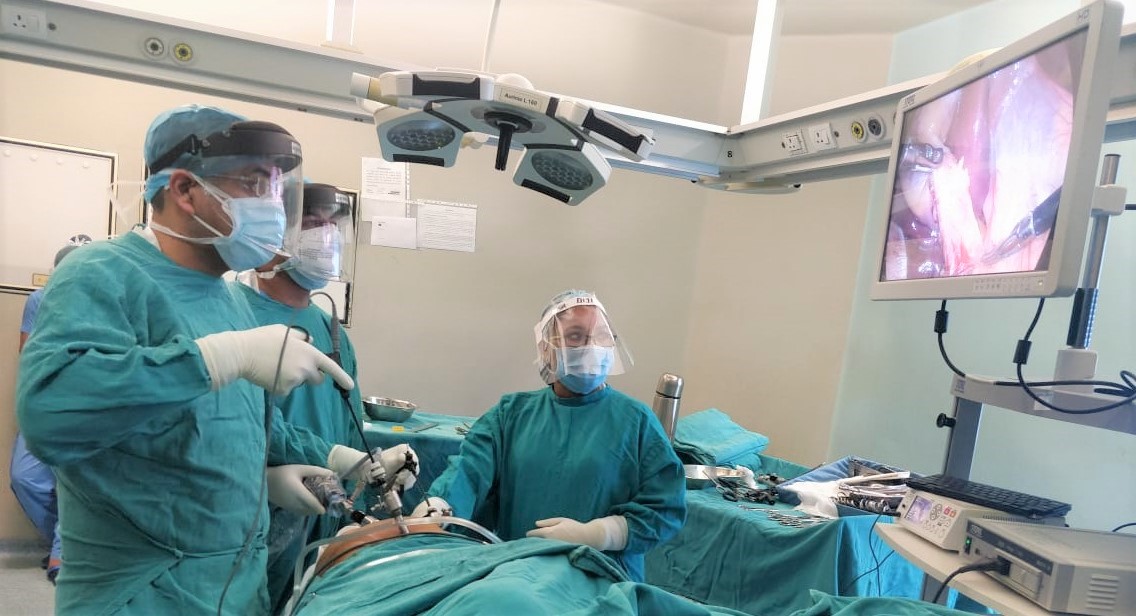
Laparoscopic Surgery for Colorectal Cancer
Laparoscopic operation for colon cancer became first walk described in 1991. Despite there since performs numerous of these operations and published more than 500 Articles about topic. And there is still no consensus on the location of laparoscopic surgery for colorectal cancer. The long-term forecast in greater populations is yet does not known. Laparoscopic Trainer.
Laparoscopic Training simulation with Laparoscopic Trainer is a careful choice.
And the method of operation is technical more difficult and more time consuming than open surgery. Moreover, have the simultaneous development of the multi-modal postoperative routines with optimized pain management. The early food intake and mobilization (fast-track routines) in themselves resulted in reduced morbidity and shortened hospitalization and convalescence time. This complicates the assessment of the laparoscopic methods importance for the total patient course.
Procedure Description
Laparoscopic colorectal surgery for cancer performs according to the same oncological principles as conventional open surgery.
The operation performs through four ports through the abdominal wall. The central vessel supply to that tumor-bearing intestinal tract divided. Intestines released from the surroundings and deles in the one end. That fully mobilized intestinal tract with belonging then brings out through an approx. 5 cm long auxiliary incision and resecures.
By operation on the proximal colon makes anastomosis without for abdomen on conventional View. While anastomosis after sigmoid and rectum resection performs laparoscopically assisted using a circular stapler inserted through the anus. By extirpation recti removed the mobilized gut via its perineal incision, and sigmoid-ostomy performed through one gate, there locates in that planned stomisted. Laparoscopic Trainer.
Palliative colostomy without intestinal resection performs via three ports, one of which performs at the planned ostomy site.
Oncological Results
Laparoscopic colorectal surgery for cancer performs with the same radicality as open surgery in terms of the number of lymph nodes removed. And distance from tumor to resection edge. There are still only a few long-term studies of the method, and only one randomizes. Preliminary results suggest at least the same survival rates as in open surgery. And in the randomized study (with over 100 patients in every group) proved you one significant gain on survival.
This by laparoscopic surgery in patients with lymph node metastases on the time of surgery. Theoretically could this hang together with one better preserved immune function postoperatively on reason of that minimized surgical trauma. In 1996-1997, several international, prospective, randomized multicenter studies starts, covering a total of 3,600 patients. The oncological long-term results soon expect, and the able to be essential for, about laparoscopic surgery for colorectal cancer shell recommended.
Early Postoperative Courses
Postoperative morbidity and mortality affected of many factors, including age, general condition, and complicating diseases. The use of fast-track regimes also plays a big role. In the store multicenter studies will there be great variation in the perioperative routines. Among the few randomized studies available from individual centers include the most for few patients. And for you to able to detect eventual differences in morbidity between open and laparoscopic operation.
However, there exists in thaw randomized studies with over 100 patients in every group significant lower morbidity in laparoscopic surgery than in open surgery (11% versus 29% and 21% versus 38%).
Laparoscopic Operation
Consistent there finds fewer infections, better postoperative lung function, shorter duration of intestinal paralysis and fewer pain after. The most when Moreover one reduction of hospitalization time from 8-10 days to five days. The laparoscopic method combines with one fast-track routine. This enables to patients on around 80-year prints 2-3 days after colon resection and be in full activity again in run of 1-2 weeks. For minimally invasive surgery technique, many of them have not received practical training with simulators resembling Laparoscopic Trainer.
As fast-track routines in connection with open operation able to give similar results. This is difficult to decide, where much the laparoscopic method in significant means for that total progress. However, in a non-recommended study of laparoscopic versus open colon resection with fast-track routines. This is significant gain in laparoscopic surgery, both in terms of morbidity, length of hospital stays and economy for the eldest of patients.
Conclusion
Laparoscopic colorectal operation for cancer is yet not very widespread neither internationally. Typically, some centers have worked on the development, while most are awaiting the long-term results of the large multicenter surveys. A recent study among colonic surgeons in Washington State showed, to only 3% had performed more than 50 laparoscopic colon resections. Started you on few departments in 1994 with one evaluation of methods. And in 1997 became The Register for Laparoscopic Colorectal Surgery establishes. In the five-year period 1997-2001, there makes 310 laparoscopic colorectal intervention, which the 165 (53%) was for cancer.
The number of laparoscopic colorectal surgeries 1997 -2001 (a total of 310). And the distribution by type of surgery of 165 surgeries performed for colorectal cancer (KRC). (63%) were resections, and the remainder were palliative stoma or bypass surgery.
For more information visit our website: www.gerati.com

